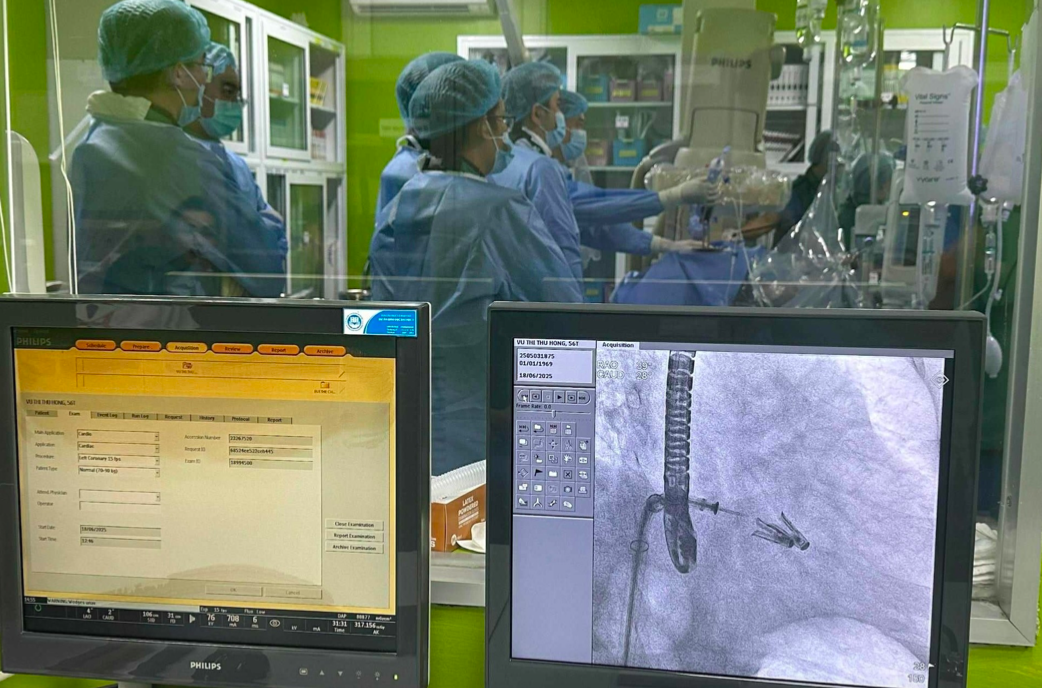This information was shared by Professor Pham Manh Hung, President of the Vietnam Interventional Cardiology Association, at the 11th National Interventional Cardiology Conference held on 20/9 and 21/9. The conference attracted over 1,000 specialists, doctors, and researchers from Vietnam and other countries, including Singapore, South Korea, France, Germany, Thailand, and Indonesia, to discuss the latest advancements in interventional cardiology.
Statistics from the Ministry of Health show that 25% of Vietnamese adults suffer from cardiovascular diseases. These diseases cause approximately 200,000 deaths annually in Vietnam, making them the leading cause of death, followed by cancer. Professor Hung noted that in addition to traditional risk factors for non-communicable diseases such as physical inactivity, smoking, alcohol consumption, and diet, the rise and increasingly younger demographic affected by cardiovascular disease are also due to emerging risk factors related to the environment and stress.
"Cardiovascular disease is like a silent killer because it progresses quietly but has serious consequences," Professor Hung stated, adding that as life expectancy increases and risk factors accumulate, cardiovascular diseases also increase, posing significant challenges for treating older patients.
Many complex cardiovascular diseases in the elderly require increasingly complex techniques and approaches, such as heart valve diseases and multi-vessel disease, due to the increasing prevalence of atherosclerosis-related degeneration in older adults. However, thanks to advancements in modern interventional cardiology techniques, tens of thousands of patients have avoided complex open-heart surgeries, experiencing faster recovery times and fewer complications. In particular, elderly patients with multiple comorbidities who previously had limited treatment options are now significantly benefiting from minimally invasive interventional procedures.
 |
Live broadcasts of interventions from major centers in Vietnam, Singapore, and Germany, along with specialized sessions on cardiovascular diseases, took place at the conference. Photo: Khanh Vy |
Live broadcasts of interventions from major centers in Vietnam, Singapore, and Germany, along with specialized sessions on cardiovascular diseases, took place at the conference. Photo: Khanh Vy
The first coronary intervention in Vietnam was performed in 1995 (18 years after the global debut), marking the birth of the interventional cardiology field, which has since grown significantly. Before 2000, Vietnam had only three interventional cardiology centers. Today, there are over 130 centers with more than 500 specialized interventional cardiologists, performing approximately 100,000-150,000 interventional cardiology procedures annually.
Coronary intervention is now a standard procedure, and many other advanced techniques have been implemented, keeping pace with global advancements: Interventions for complex coronary artery diseases (chronic occlusion, calcification, high risk, etc.); transcatheter heart valve replacement and repair; interventions for the aorta and peripheral vascular disease; and treatment of heart failure and hypertension using transcatheter devices.
"These achievements make Vietnam a bright spot in the region, contributing to improving the quality of treatment and life expectancy for Vietnamese cardiovascular patients. This also helps limit the number of Vietnamese people seeking treatment for cardiovascular diseases abroad," Professor Hung explained.
To prevent cardiovascular disease, experts recommend that people engage in 30 minutes of daily exercise such as walking, cycling, or swimming. They also advise eating plenty of green vegetables and fruits, limiting fast food and high-fat foods, reducing smoking and alcohol consumption, and managing conditions like high blood pressure, diabetes, and dyslipidemia.
Le Nga












